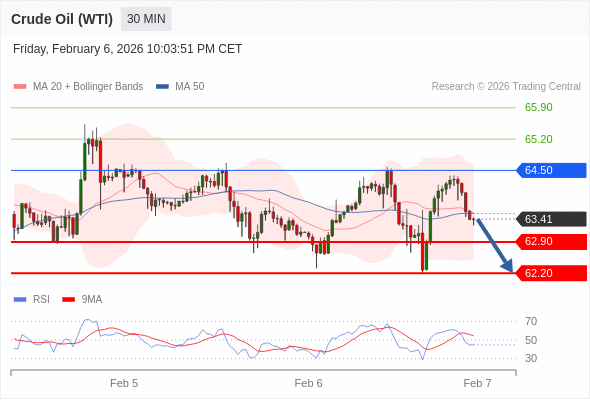WTI
USOIL63.303USD
本日
+0.33%
5日間
-3.10%
1ヶ月
+12.67%
6ヶ月
-0.34%
年初来
+10.72%
1年間
-10.56%
主要データ
始値
62.919前日終値
63.097指標
本指標機能は、各種テクニカル指標を用いて金融商品の数値分析と方向性評価を提供し、技術的な要約を表示します。
本機能ではMACD・RSI・KDJ・StochRSI・ATR・CCI・WR・TRIX・MAの9種類の主要テクニカル指標を網羅しています。時間軸はご自身のニーズに合わせて調整可能です。
テクニカル分析は投資判断の一要素に過ぎず、数値による方向性評価に絶対的な基準はありません。表示結果はあくまで参考情報であり、指標計算・要約の正確性について当方は責任を負いかねます。
WTI 取引戦略

取引戦略
Short positions below 64.50 with targets at 62.90 & 62.20 in extension.
代替シナリオ
above 64.50 look for further upside with 65.20 & 65.90 as targets.
コメント
short positions below 64.50 with targets at 62.90 & 62.20 in extension.
WTI ニュース
ベネズエラの石油輸出でUSDTが多用、ビットコイン・ドミナンスは危機に瀕しているか?
マドゥロ政権による原油決済へのテザー(Tether)の積極的な採用が、USDTの時価総額急増に拍車をかけている。この傾向により、同銘柄の時価総額がビットコインを上回ることになるのだろうか。

世界の原油埋蔵量第1位国の転換後、ベネズエラ原油市場で最大の勝者となるのは誰か?
TradingKey - 米国大統領ドナルド・トランプ氏は火曜遅くに、ベネズエラの暫定当局が3,000万から5,000万バレルの原油を米国に供給すると述べた。米国はベネズエラの石油産業との関係を深く回復すると予想されており、これは湾岸地域に長年拠点を置き、複雑な重質原油の処理に対応した設備を持つ米国の精製業者にとって「遅れてやってくる配当」となる可能性がある。

トランプ、対ロシア政策を180°転換!ロシアの主要石油企業2社に制裁、原油価格が5%以上上昇
TradingKey - 米東部時間の水曜日、トランプ政権はロシア最大の石油企業2社に対し新たな制裁を発表しました。これはロシアにウクライナ問題での和平交渉を強制することを目的としています。この制裁は、トランプ政権がロシア・ウクライナ紛争に対してロシアに直接経済圧力をかける初めての措置となります。

COLUMN-OPECプラス増産合意、生産余力浸食で価格変動リスク
石油輸出国機構(OPEC)とロシアなど非加盟産油国で構成する「OPECプラス」が増産を継続していることで、生産余力は浸食されつつある。この生産余力は近年、価格変動を緩和する重要なバッファー役を果たしてきただけに、トレーダーは今後、より厳しい状況に直面するかもしれない。 過去3年間の石油市場では、供給不足が生じてもOPECプラスが素早く埋められるという説が強く信じられて



